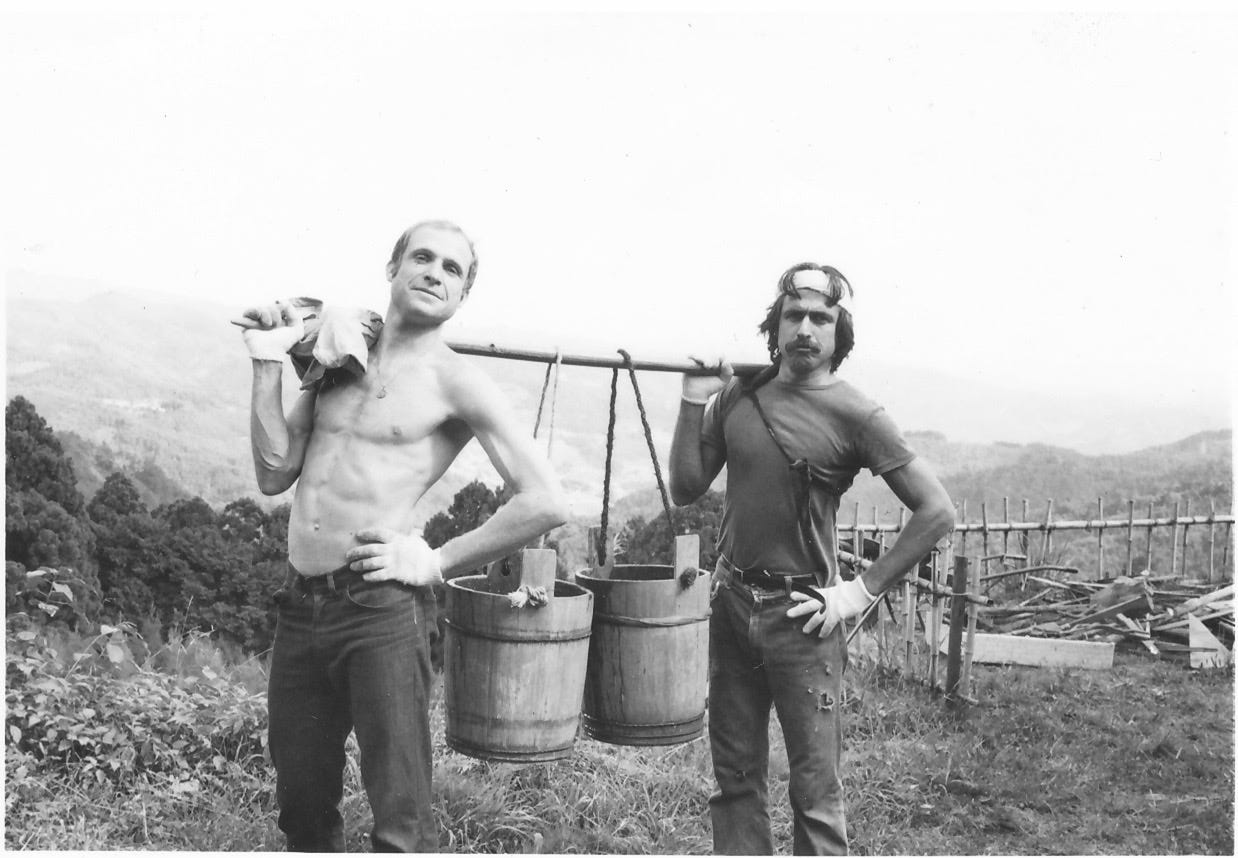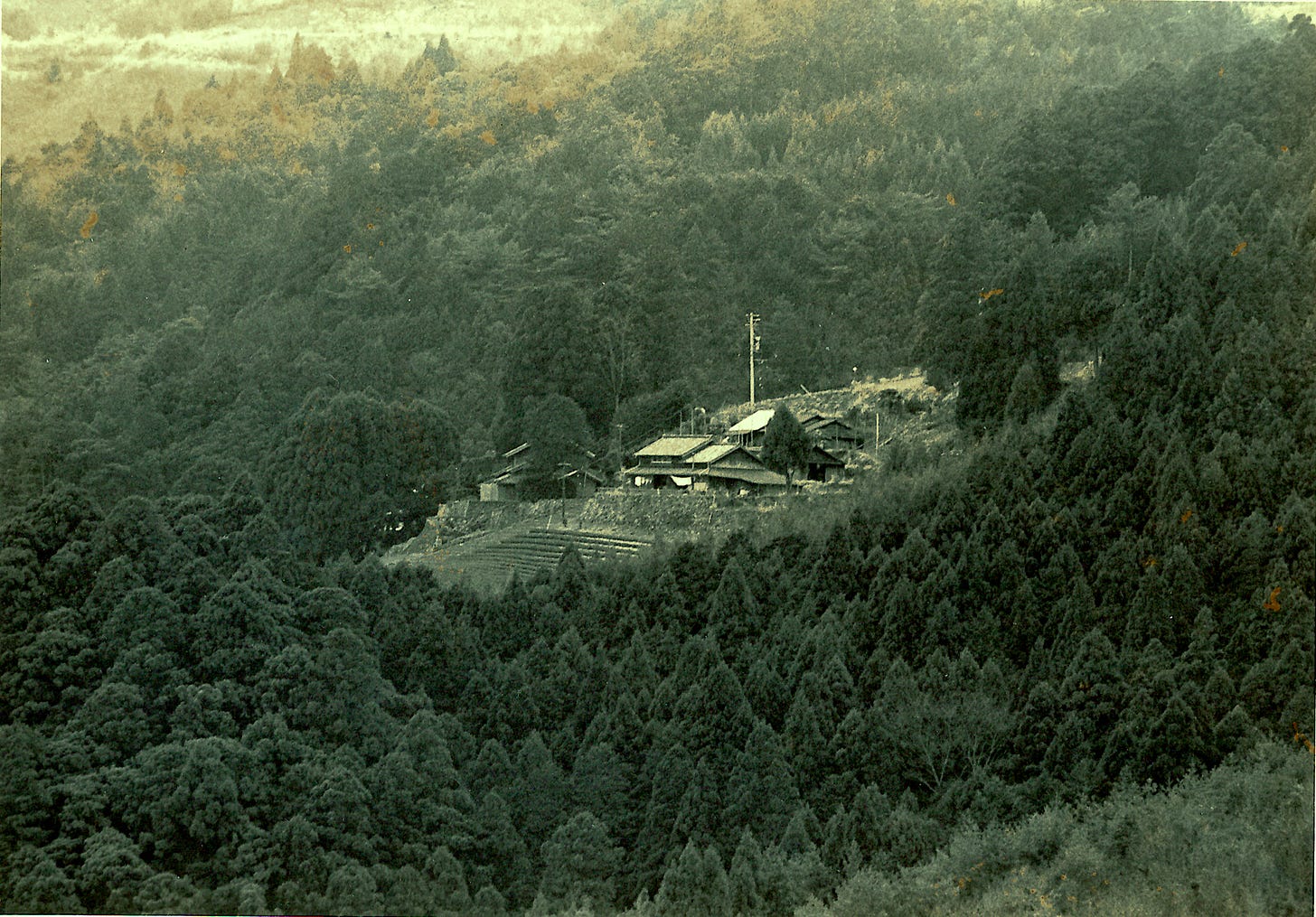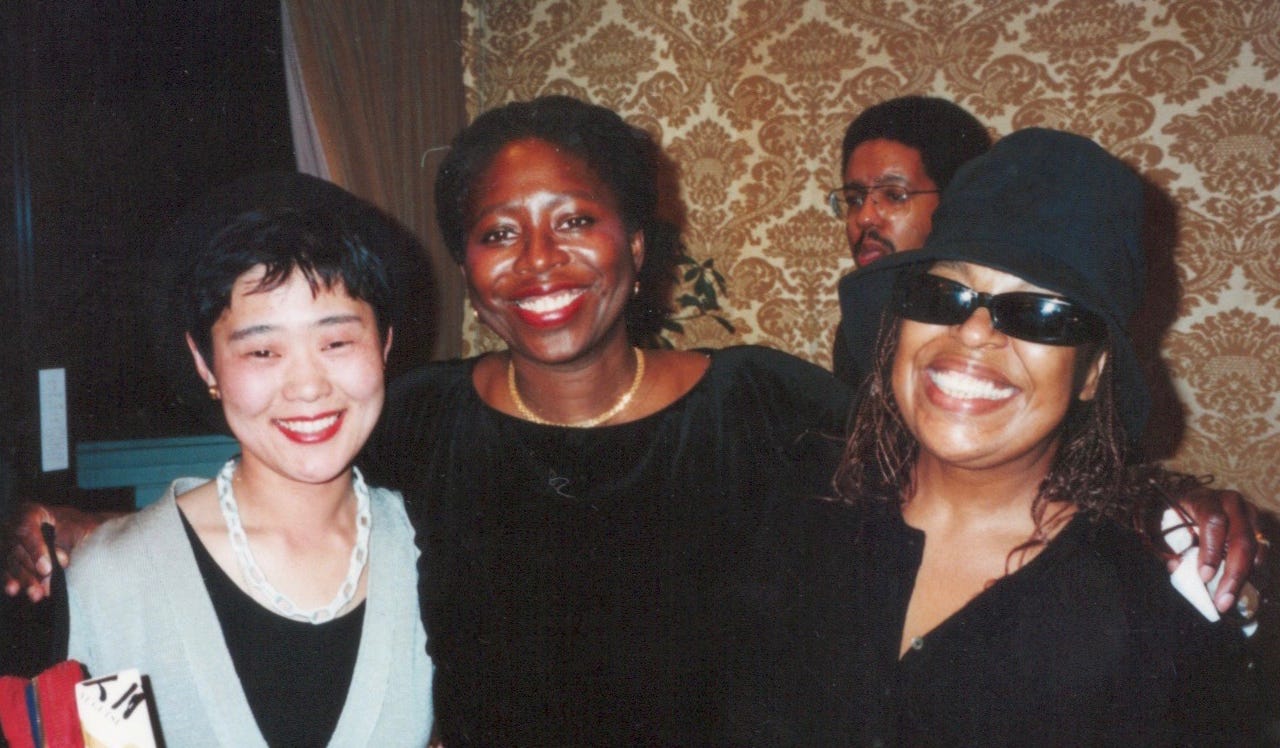An American in Japan—50 Years | Part II
Living in "the middle of nowhere", connecting with people far and wide
When I’m abroad and people learn I live in Japan, most assume I live in the metropolis, Tokyo, or perhaps, the ancient capital, Kyoto.
Shizuoka, a provincial prefecture, similar to a state, located roughly in the geographic center of Japan’s main island, Honshu, is where I’ve settled.
Our first home here was an old farmhouse perched on the side of a mountain called Futokoro Yama 懐山 (Breast Pocket Mountain). The farmhouse, while traditionally charming, had nothing that could be called a convenience. To be precise: no flushing toilet, no heating/cooling system, no running hot water — meaning we built a fire every night to heat the ofuro, the deep Japanese bath.
During the seven years we lived in that isolated hamlet, there were exactly three neighboring households. Our neighbors, farmers without exception, lived out their lives in a quiet continuum with the seasons.
Though they’d never experienced foreigners living in their midst, they were welcoming, making an effort to introduce us to country life. I was taught Bon odori so I could participate in the summer festival.
Practical information was provided by next-door neighbor Ōishi-san, who instructed my husband Billy on how to restore the sumi hori-kotatsu (brazier heated with charcoal) that kept us warm in winter in that drafty farmhouse. Õishi-san also gave instruction in how to empty the benjo, toilet . Yes, we had to do it ourselves.

Ever generous, the Õishi family often gave us vegetables from their fields. And often too, I was the recipient of gifts of pickled and fermented foods I couldn’t identify. Similarly, our neighbors were sometimes mystified by my foreign ways.
There was the time a fox came to nibble at a pumpkin pie I’d put outside to cool. I grew up in NYC. I’d never seen a fox in my life . When I excitedly told Ōishi-san (the wife) about it, she was more curious to know what I’d done with the kabocha (squash) she’d given me than about the fox.
Although I’d become a familiar figure in the area, it was clear that the simple people I lived among were not accustomed to seeing someone who looked like me. Still, no one ever tried to rub the color off my skin, as had happened when we trekked to the Karen hill tribe in northern Thailand.
Where we lived at Futokoro Yama, and where we live still, foreigners of any complexion are rare. At no time and nowhere do I go unnoticed. If I want to see someone who looks like me, I will look in the mirror.
Connecting through columns
In 1978, I began writing a regular column for the Japan Times, Japan’s oldest and largest English-language newspaper. My column “Crossing Cultures” gave a glimpse of life in Japan, from the perspective of an American woman participating in Japanese society in every way—and not as part of an expat community.
The column reached a wide audience, presenting a way for me to connect with English readers in Japan and all over the world. In the days before email, I regularly received handwritten and typed letters from places as far-flung as Ghana, Ireland, Poland, Sri Lanka, and Hawaii. The prevailing sentiment said that through me, they felt they were experiencing “the real Japan”.
Beginning in 1983, I was invited to write a column for a regional edition of the Japanese newspaper Chunichi Shimbun. That column, titled “Another Look”, written in English, addressed an exclusively Japanese audience who were invited to translate it.
The editor started the column as a pilot project, aware that quite a few Japanese who don’t speak English fluently can read and translate it. Interested to know the first-hand views of an American woman living in Japan, often hundreds of translations were submitted for each column, which ran for fifteen years, until the editor retired.
Sometimes it was through pure serendipity that connections were made, and the ‘outside world’ was brought to my remote corner of Japan. That’s how John Denver, introduced by a reader of my column, came to spend a few days with us at the farmhouse.
Happy to get off the road during a tour, he accepted our humble accommodations. He loved the countryside, and told me we’d found “a bit of Paradise”.
John had a huge following in Japan, and when word got out he was at our house—not a place anyone ever passed—people started showing up at our door. In gratitude for the community’s welcome, he gave an impromptu concert at the village shrine.
Roberta Flack too has a devoted and enthusiastic following in Japan, and a reader who recalled I’d written about how much I loved Roberta’s voice, told me she’d be playing a concert nearby.
After the concert I went backstage. This was during the 1980s. No security blocked my entrance, no one asked for ID, there was no need to lie saying “I’m with the band.” Going to the open door of her dressing room I called out “Roberta!” She responded: “Hey, hey! I’ll be out in a minute.” As if she knew me.
After spending the evening together, a friendship was born. I’d later visit her at her home in Manhattan, and whenever she performed in Japan I’d be given VIP seats.
One particularly memorable occasion was the time my daughter’s boyfriend told me his mother was a big fan of Roberta’s. His mother didn’t speak English, but she knew all of Roberta’s songs. On this occasion, Roberta was playing Tokyo’s Blue Note, and I invited his mother to come with me. When I went backstage after the show and introduced her to Roberta, overwhelmed, the woman burst into tears. Roberta gathered her in a warm embrace.
Long before I knew Roberta, long before I could call her a friend, I always thought she must have a personality that perfectly matched her voice. And she did. Warm, generous, inviting, engaging, and compassionate. Though we sadly lost her this year, her voice, like her friendship, is an enduring treasure.
When my memoir The View From Breast Pocket Mountain was published, Roberta, ever generous, gave me this endorsement:
My good friend, Karen Hill Anton, has written a beautiful memoir of her life that inspires us all to embrace what life brings our way with joy, love, and always a deep sense of goodwill. — Roberta Flack










Oh Karen, I just love this column. Today I am brought to tears and brought into your story - Mr Denver doing and impromptu concert in the village, Roberta Flack greeting you with open arms, and your friend being so moved by her meeting with her. I’m truly magically delighted by these stories.
In a recent Instagram post, a local friendly acquaintance who is a little younger than Lila (I think) wrote "I forget that not everyone's life has been biblical in the way mine has been." She meant the epic rises and falls she's experienced.
You, on the other hand, seem to not notice how exceptional your life has been. Maybe it doesn't feel that way to you, but the view from here sure suggests that.
John Denver? Roberta Flack? ROBERTA!? Amazing. You must have been sad to lose her this year.
Looking forward to Part 3.